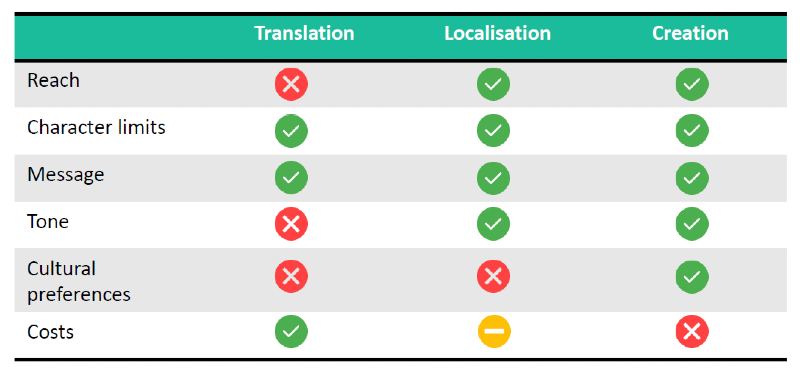
Let’s imagine that your company wants to reach a larger international audience. If you are already running successful PPC campaigns in English, you may want to know how best to utilise these to target new markets.
When it comes to rolling out your PPC campaigns to new markets, there are three main strategies you can pursue: translation, localisation and creation. Each of these strategies do tailor your campaigns for international markets to various degrees; you just need to choose the right approach for you.
- Translation: The direct translation route is the most basic option. Here, you are simply translating your PPC campaign, without taking into account the local culture or search landscape.
- Localisation: You can go one step further by conducting localisation using search specialists. This approach would include the expansion of your existing keyword list and would involve a bit more thought and creativity when it comes to incorporating these keywords into your ad copy.
- Creation: You can go one step further again by creating your entire PPC campaign from scratch. This is ultimately the ideal way of creating a campaign, as everything you create will be bespoke and tailored to the needs and expectations of the local target market and target audience.

Whichever approach you take, make sure to consider the following things:
- Reach
- Character limits
- Message
- Tone
- Cultural preferences
Consider the above factors in terms of what your objectives are, what your budget is and what will deliver the best value for you. The comparison table below summarises how the three strategies compare for each aspect:

Let’s dive into each strategy in a bit more detail.
1. Translation
Translation will not give you the best reach since you will just be translating your keywords. This will inevitably lead to you missing out on opportunities, since you will not be able to discover the most popular keywords that your target audience is actually searching for. When translating your ad copy, you can make sure that you stick within character limits and that you deliver the right message, but the ad copy may not have the right tone. You may also fail to adhere to your target audience’s cultural preferences. So, whilst translation is the most affordable option, you will find that it does not bring you the best possible results.
2. Localisation
Localisation allows you to do better in many of the areas where translation is lacking. For example, you can conduct keyword expansion and keyword research to make sure you are not missing out on any keyword opportunities, and you can utilise these keywords in your ad copy, which will help you to strike a more appropriate tone in your ads. However, localisation is still not the perfect solution, since you may still not be fully engaged with your target audience’s cultural preferences. In terms of cost, localisation is more expensive than translation, but it will deliver that extra value that could make a big difference to your PPC campaign.
3. Creation
Creation from scratch is the ultimate solution. By creating your PPC campaign from scratch for your specific target audience, with native search specialists assisting you throughout the process, you can make sure that you are consistently striking the right tone and that you are setting yourself up for success as much as possible. Unsurprisingly, this is the most expensive option out of the three, but it will deliver the best value, since you are tailoring everything to the needs and expectations of your target audience from beginning to end.
Conclusion
Translating your PPC campaigns is better than having them in English, but it is not necessarily the best option.
The best option is to tailor your PPC campaigns to each specific country you are targeting, whether that is by building the campaigns from scratch so that they are super-targeted and relevant, or by taking that middle ground of localisation where you are utilising content that you already have in another language and tailoring it for other markets you want to do PPC activities in.
Ultimately, it is up to you as a business to understand what your limits are, what your preferences are, and what the needs of your target markets are.
Want to learn more?
I hope this blog post has been a useful introduction to the different strategies available for expanding your PPC campaigns to new markets. For more in-depth information and advice, read my full-length guide here! From reading this guide, you will learn:
- why localised PPC campaigns are important
- 3 strategies for expanding your PPC campaigns to new markets
- how to localise your PPC campaigns the right way
- our recommended localisation workflow
You can also watch a recording of a webinar that I presented on this topic, here.






